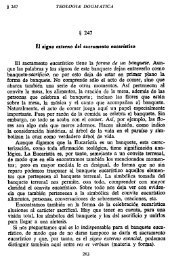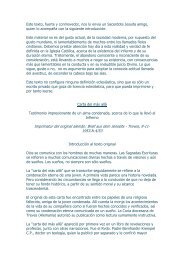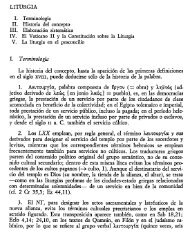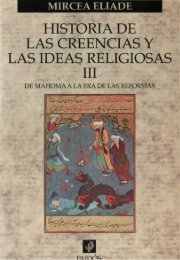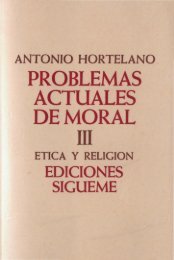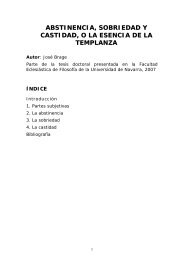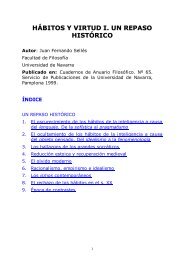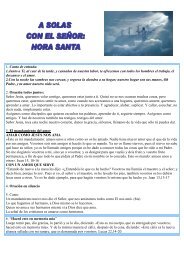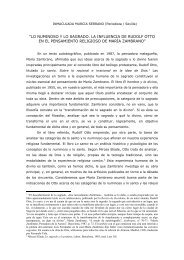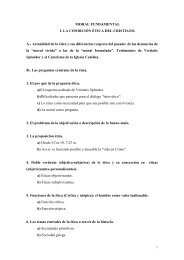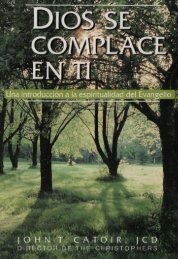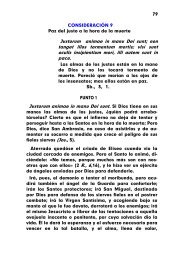de sahagun lucas, juan - fenomenologia y filosofia de la religion.pdf
de sahagun lucas, juan - fenomenologia y filosofia de la religion.pdf
de sahagun lucas, juan - fenomenologia y filosofia de la religion.pdf
Create successful ePaper yourself
Turn your PDF publications into a flip-book with our unique Google optimized e-Paper software.
XIV índice general<br />
Págs.<br />
2. Origen antropológico-religioso <strong>de</strong> <strong>la</strong> religión 134<br />
III. Categorías religiosas y formas afines 136<br />
1. Categorías y prácticas religiosas 136<br />
a) Fe y oración 136<br />
b) Fiesta y culto 137<br />
c) Sacrificio 138<br />
d) Culpa y pecado 139<br />
e) Muerte e inmortalidad 139<br />
2. Formas afines a <strong>la</strong> religión 140<br />
a) Magia 140<br />
b) Hechicería 141<br />
c) Superstición 141<br />
IV. Recapitu<strong>la</strong>ción 142<br />
V. Religión y <strong>religion</strong>es 142<br />
1. Esquema y c<strong>la</strong>ses <strong>de</strong> religión 143<br />
a) Religión profética y sapiencial 143<br />
b) Religiones politeísta, henoteísta y monoteísta .. 143<br />
c) Religión mística 144<br />
d) Religión tribal 144<br />
e) Religión primitiva 144<br />
2. Razón <strong>de</strong>l pluralismo religioso. Religión y <strong>religion</strong>es . 145<br />
CAPÍTULO VI. Interpretaciones <strong>de</strong>l hecho religioso. Teorías . 149<br />
I. Concepto <strong>de</strong> religión en <strong>la</strong> mo<strong>de</strong>rnidad 151<br />
1. La Ilustración y <strong>la</strong> religión 151<br />
2. El concepto <strong>de</strong> religión en Hegel 155<br />
II. Crítica marxista <strong>de</strong> <strong>la</strong> religión 159<br />
1. Presupestos i<strong>de</strong>ológicos <strong>de</strong> <strong>la</strong> crítica marxista .... 159<br />
a) Presupuestos hegelianos 160<br />
b) Antropologismo <strong>de</strong> L. Feuerbach 160<br />
2. Momentos <strong>de</strong> <strong>la</strong> crítica marxista: La conversión materialista<br />
y el socialismo científico 162<br />
a) La conversión materialista 162<br />
b) El socialismo científico 164<br />
3. Evaluación 165<br />
4. Reflexión crítica 166<br />
a) Falsa universalización 166<br />
b) I<strong>de</strong>ntificación injustificada 166<br />
c) Fundamentación insuficiente 167<br />
III. Teoría psicoanalítica <strong>de</strong> <strong>la</strong> religión. S. Freud 167<br />
1. Intencionalidad y presupuestos 168<br />
2. Elementos y niveles <strong>de</strong> <strong>la</strong> interpretación freudiana . 170<br />
a) La religión como neurosis 170<br />
Índice general XV<br />
Págs<br />
b) Instinto <strong>de</strong> protección e i<strong>de</strong>alización <strong>de</strong> <strong>la</strong> figura<br />
<strong>de</strong>l padre 171<br />
c) La culpa y <strong>la</strong> reconciliación 172<br />
3. Evaluación crítica 173<br />
a) Patología <strong>de</strong>l <strong>de</strong>seo 174<br />
b) Centralidad <strong>de</strong>l banquete totémico 174<br />
c) Carácter represivo 175<br />
IV. La filosofía analítica y <strong>la</strong>s expresiones religiosas 176<br />
1. Encuadre histórico 176<br />
2. L. Wittgenstein: dos etapas 177<br />
3. Crítica <strong>de</strong>l neopositivismo lógico 179<br />
4. Alcance significativo <strong>de</strong>l lenguaje religioso 179<br />
a) Simbólico 180<br />
b) Autoimplicativo 180<br />
c) Aceptativo 180<br />
d) Reinterpretativo 181<br />
e) Participativo-comunicativo 181<br />
CAPÍTULO VII. Justificación racional <strong>de</strong> <strong>la</strong> actitud religiosa . 183<br />
I. Presupuestos fundamentales 184<br />
1. Experiencia prefilosófica 184<br />
2. Vivencia religiosa 185<br />
II. La experiencia trascen<strong>de</strong>ntal 186<br />
1. Precisiones <strong>de</strong> W. Pannenberg 187<br />
a) El hombre, ser inacabado 187<br />
b) Autotrascen<strong>de</strong>ncia <strong>de</strong>l espíritu humano 187<br />
c) Subjetividad y religiosidad 188<br />
d) Destino último <strong>de</strong> <strong>la</strong> persona humana 188<br />
2. La aportación <strong>de</strong> K. Rahner 189<br />
III. Experiencia ontológica 190<br />
1. Concepto <strong>de</strong> religación en Zubiri 191<br />
a) La realidad 192<br />
b) La inteligencia 192<br />
2. Dimensión teologal <strong>de</strong>l hombre 193<br />
3. Connaturalidad <strong>de</strong> <strong>la</strong> religión en el hombre 194<br />
IV. El encuentro interpersonal 195<br />
1. La alteridad humana, raíz <strong>de</strong>l encuentro 196<br />
2. El Tú absoluto (Dios), exigencia <strong>de</strong> <strong>la</strong> alteridad humana<br />
199<br />
a) Inobjetividad <strong>de</strong>l término 199<br />
b) Racionalidad <strong>de</strong> <strong>la</strong> actitud religiosa 200<br />
3. Conclusión: La religión como respuesta al enigma<br />
<strong>de</strong>l hombre 203



